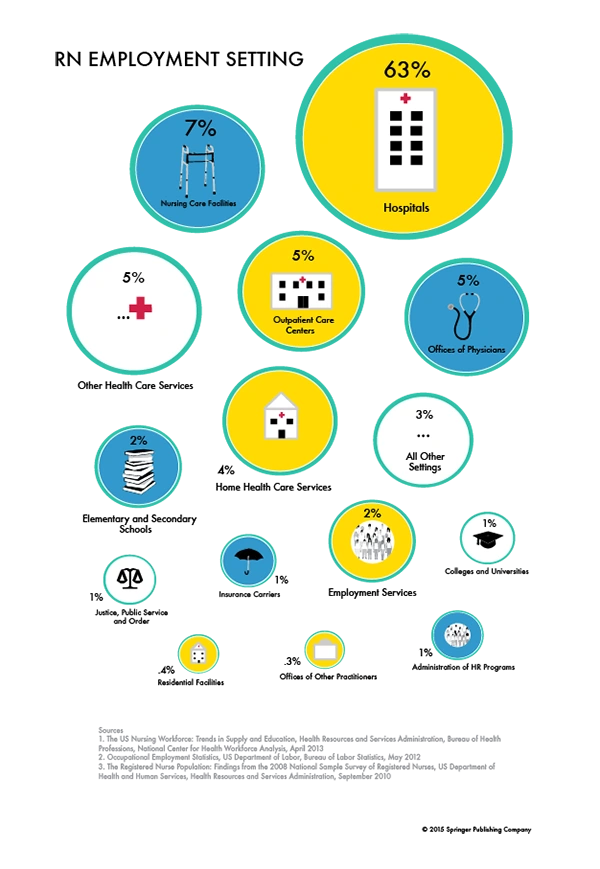
KEY TAKEAWAYS
- Understanding the ABSN program
- Discovering how one can find an ABSN program
- Learning if this program is right for everyone
After COVID-19 medical field continues to experience a high demand for skilled nurses. And it’s not like people are not joining this profession, but the thing is, a lot of people are leaving it. But even after this, it remains the most popular second-career option people move into.
The fact is, people in their thirties have a high interest in switching their careers to something meaningful. And this is where programs like the Accelerated Bachelor of Science in Nursing (ABSN) come into the light.
These ABSN programs serve people who already hold a bachelor’s degree in another field. These programs help them complete the whole coursework within 12 to 18 months.
This guide will provide you necessary information about these accelerated nursing programs and how you can take advantage of them to become a nurse.
Accelerated Nursing Degrees Overview
Accelerated nursing degrees, or ABSN programs, will vary somewhat based on the university that you choose. BSN takes an average of 4 years to complete the nursing study; on the other hand, ABSN programs generally let you earn a nursing certificate in just 12 to 18 months.
ABSNs are only an option for people who already have a bachelor’s degree. Basically, you are skipping all of the general education requirements and completing an entire nursing curriculum, all in a compressed time frame.
You do not necessarily need to be unemployed to take advantage of an ABSN program, but you do need to understand that it is very time-prohibitive.
The old college rule of thumb is that every credit hour you take translates into two hours per week of homework.
You can imagine compressing a four-year education into twelve months while holding down a job, based on that criterion.
And that’s without even taking into consideration the clinical rotations that ABSN students are still required to take on.
Nevertheless, the benefits of this degree path are obvious. If you’re 35 years old and interested in pivoting into a new career path, you probably don’t want to have to wait 4 or 5 years to make the transition. ABSN programs are your best bet at a new life in an achievable time frame.
How Do I Find an ABSN Program?
To begin with, you’ll need to find out what programs are recognized in your state. If you simply Google “accelerated nursing,” you’re probably going to find many dozens of options offered in both brick-and-mortar and virtual learning environments. Even assuming that every single program you find is fully accredited, it may or may not be recognized regionally.
State requirements and national requirements are different, and perhaps surprisingly to some people, it’s generally harder for a program to satisfy state specifications than it is the requirements of the federal government. Some states, like California, are particularly picky about what programs they will recognize.
Once you have identified regionally recognized programs, you’ll want to then decide on what format is right for you. As mentioned earlier, you will most likely encounter both virtual and brick-and-mortar curricula.
Virtual classes have the benefit of some added flexibility. You will still need to physically attend your clinical rotations, so to that end, you’ll need to make sure that the online programs have a cooperating relationship with the hospitals in your area.
Even with these hurdles in mind, remote options are generally the most user-friendly for people who are already holding down a job or balancing family responsibilities.
Online programs are like a bonus because they are usually very affordable, provided you find one that is attached to a virtual university.
Brick and mortar schools are more likely to charge their traditional per credit hour rates even when you never set foot on their campus. In that way, you wind up paying for overhead, libraries, labs, etc., that you never even get to see.
If you do decide on a remote curriculum, you will most likely have further options in the class format.
Some online programs meet with regular live lectures and will, in that way, essentially replicate the requirements of a brick-and-mortar class. Others will consist of prerecorded lessons that you can work on at your convenience.
Obviously, “your own convenience” has its limits—you are still going to be required to complete the curriculum in a condensed time frame—but that extra level of flexibility can be an effective difference maker for people who are balancing a variety of responsibilities.
DID YOU KNOW
Nearly 85% of the RN population, or about 2,596,600 RNs, are employed in nursing.

Are Accelerated Programs Right for Everyone?
Simple and short answer- NO. You can be smart enough, hardworking enough, and qualified enough to get a BSN and still not necessarily be likely to thrive in an accelerated program. It’s fast-paced. It’s hard to balance with a career or a family. And it’s just not the optimal learning conditions for everyone.
Remember: The premise behind an accelerated program is that you are learning an entire new profession in about a year. Regardless of how bright you are, that might not be your ideal learning experience. The good news? ABSN programs are not the only way to get into nursing certification
If you already have a bachelor’s degree but don’t want to do an ABSN, you still will most likely be able to choose a certification-only program in which you basically are able to tackle a Bachelor of Science in Nursing without going through the prerequisites that true college freshmen would need to tackle. In that way, you’ll still be able to get your BSN in a condensed time frame—it just won’t be quite as fast-paced as the ABSN program.
Conclusion
Are you thinking of making a career change to nursing? You can go ahead with an ABSN program, but keep a few things in mind. Like time, a fast learning pace and financial investment.
If you are someone who can perform well in a fast-paced environment and can commit full-time to their work, you are perfect for the ABSN program. But if it’s the opposite and your learning pace is quite slow, opt to take a traditional BSN.
The ABSN program can provide you with a certificate sooner than the BSN, but at the end, what really matters is the learning pace and the environment that is suitable for you.
Ans: It stands for Accelerated Bachelor of Science in Nursing.
Ans: If you have a degree in another field and you are a fast-paced learner, financially stable, and can devote your time to this program, then yes, you can do it.
Ans: There is nothing like the perfect nursing school; it depends on your preferences and requirements. But if you are looking for a top-ranked university for nursing school, some of them are the University of Pennsylvania and Johns Hopkins University.
Ans: An ADN degree is one of the fastest ways to become a nurse in the US, because it mainly focuses on coursework needed for nursing.